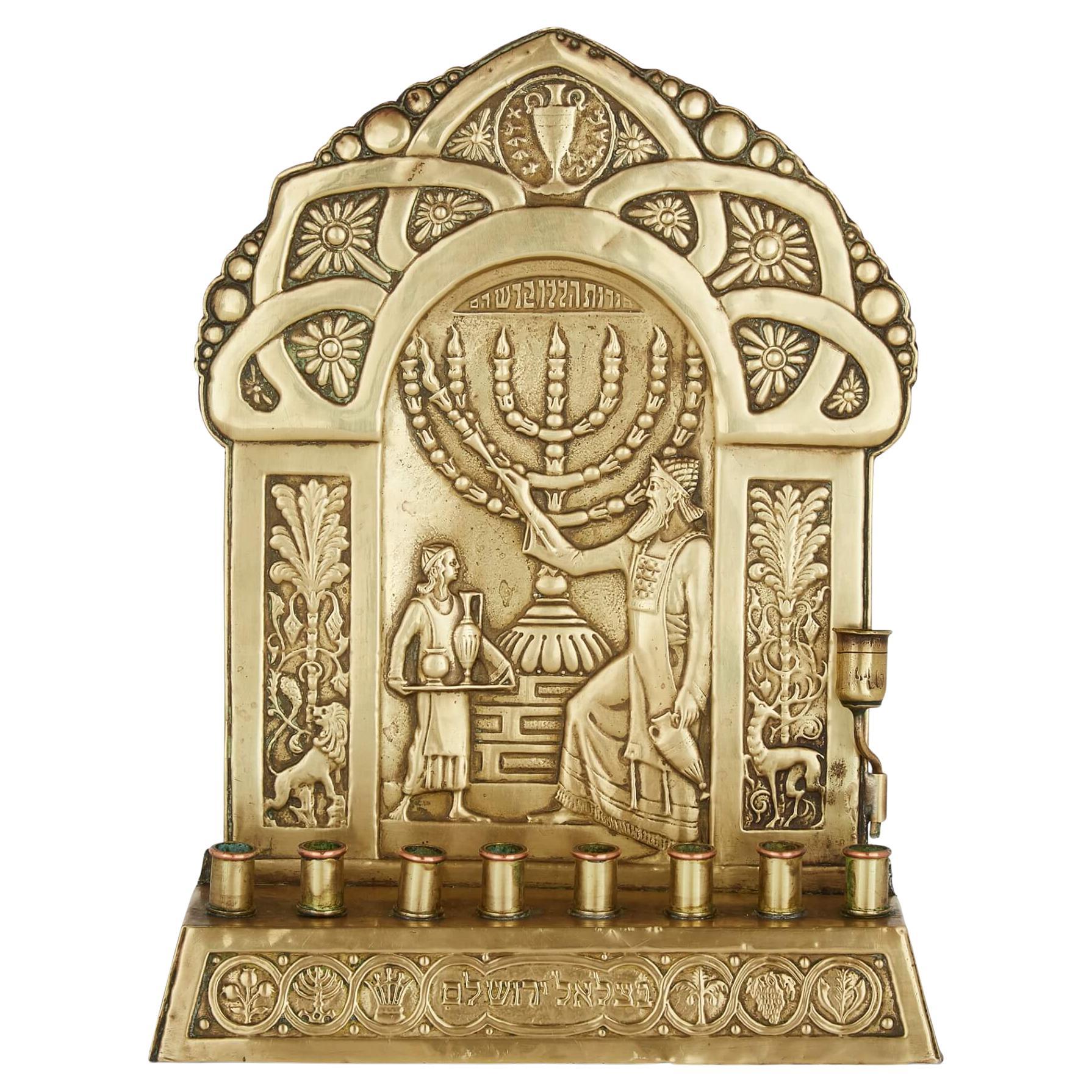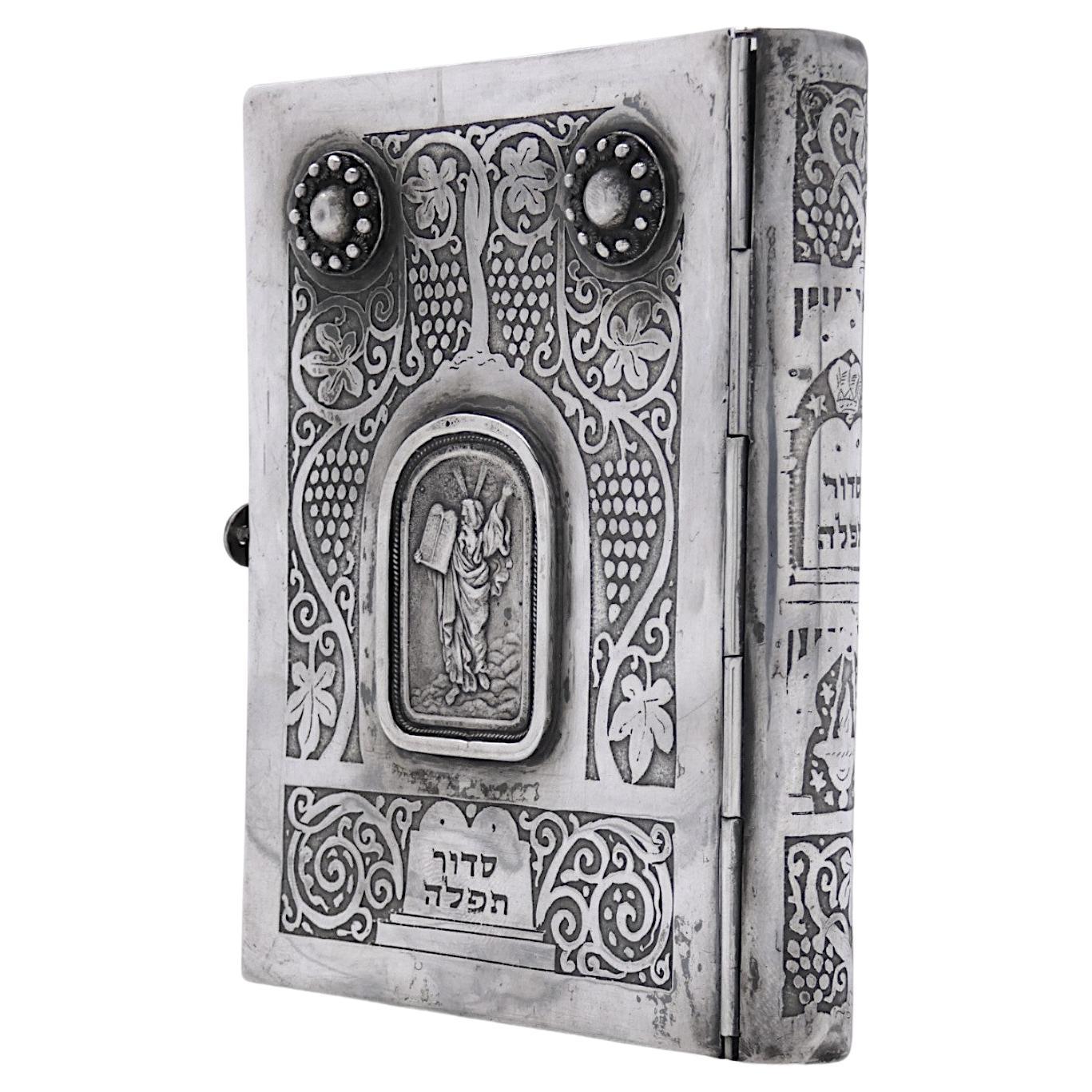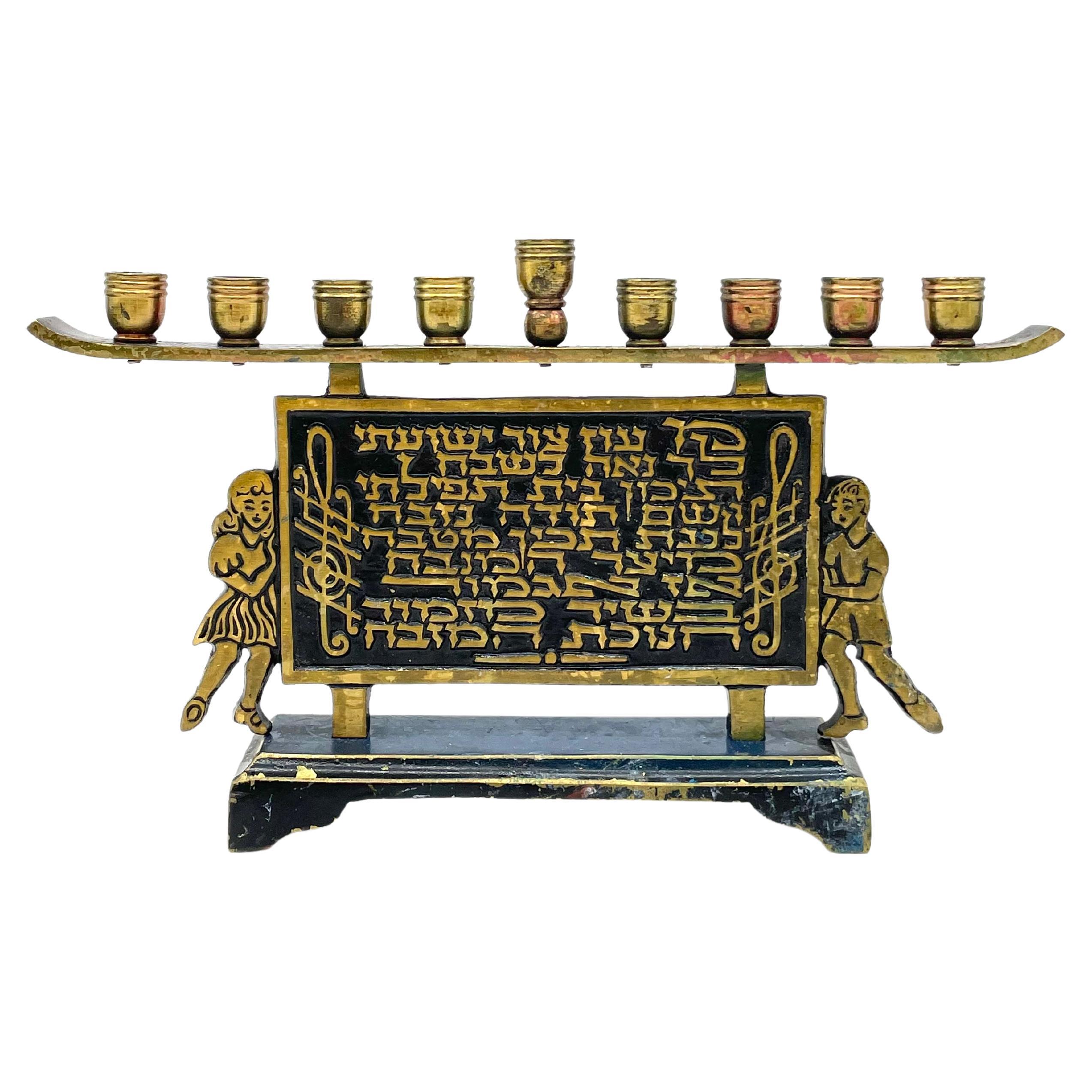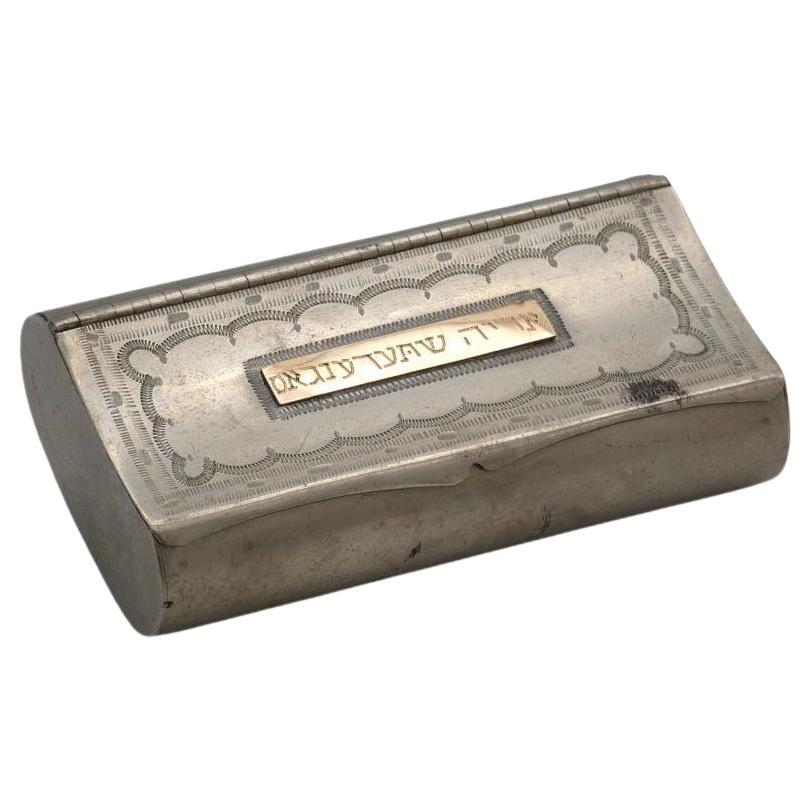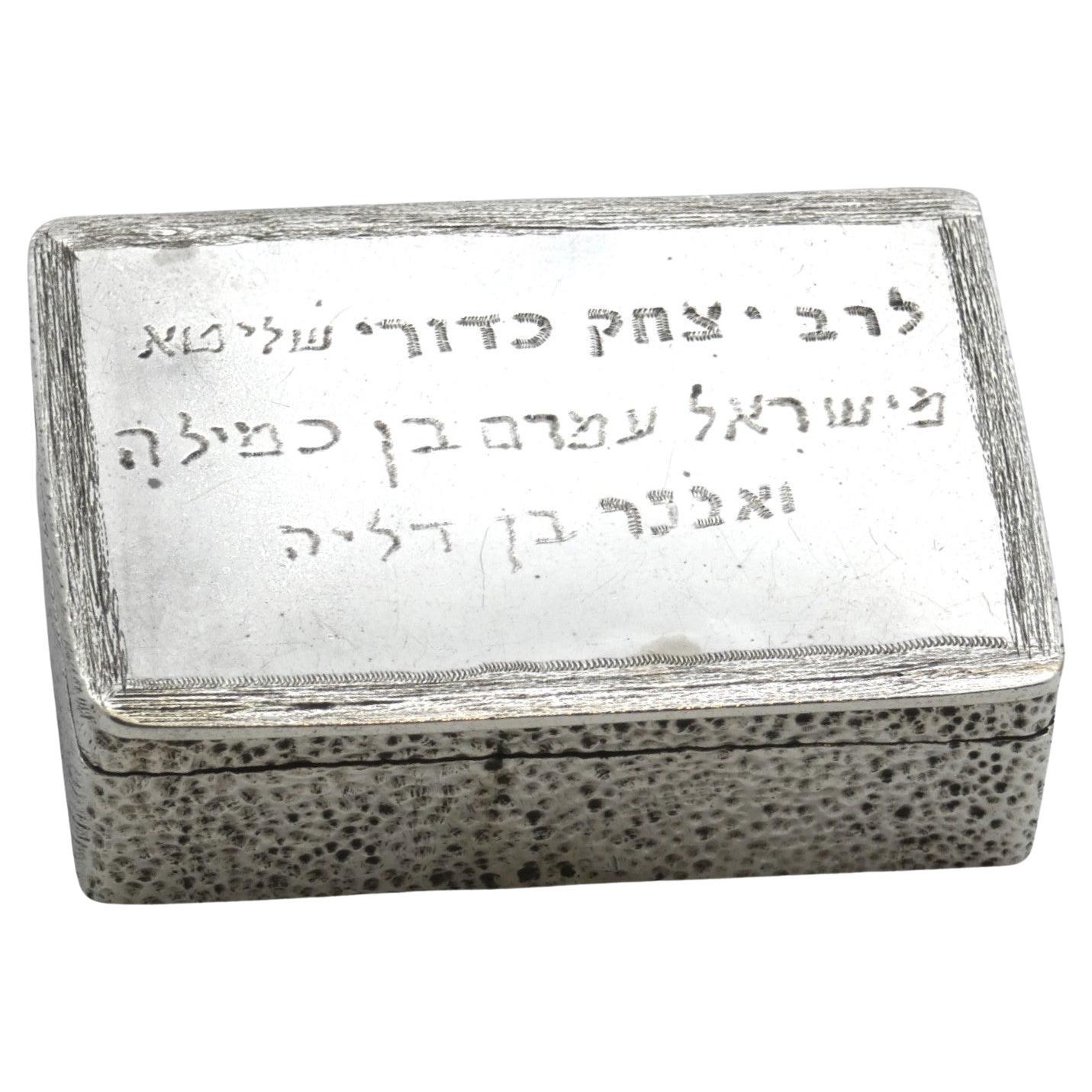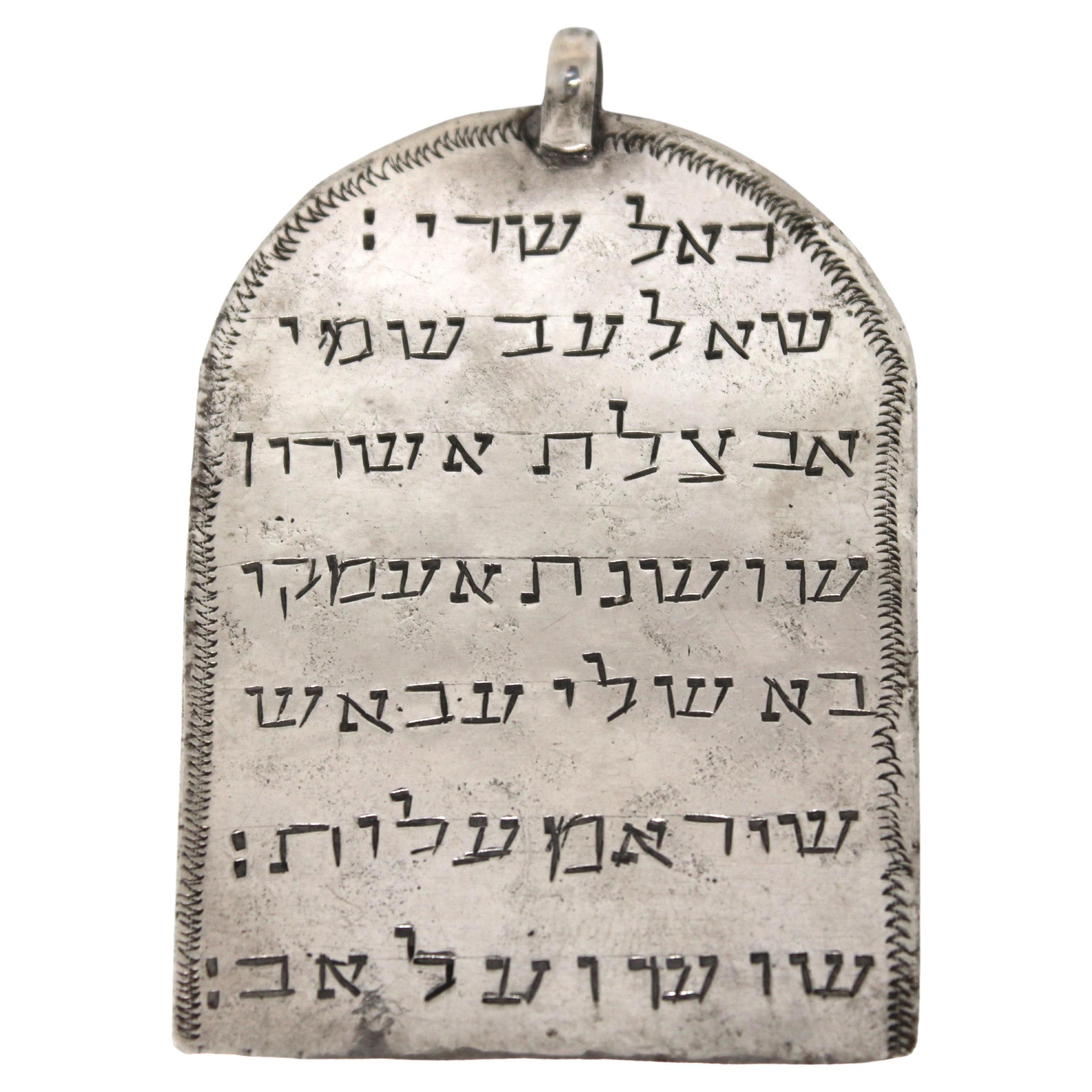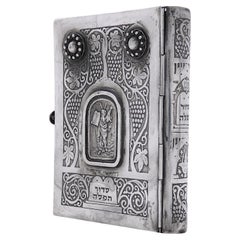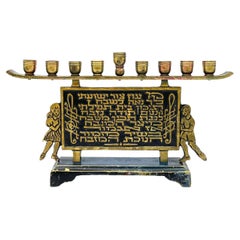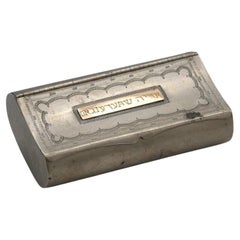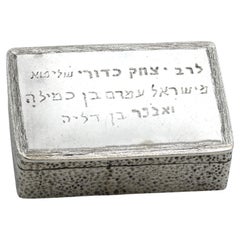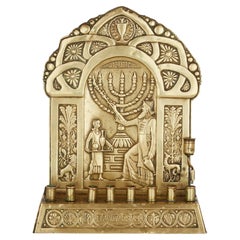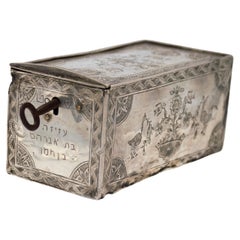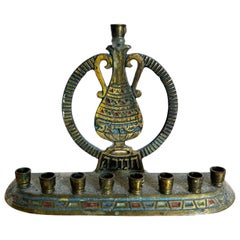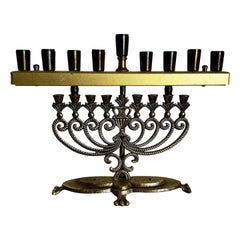Items Similar to 20th Century Israeli Sterling Silver, Brass and Wood Omer Counter
Want more images or videos?
Request additional images or videos from the seller
1 of 10
20th Century Israeli Sterling Silver, Brass and Wood Omer Counter
$3,120
$3,90020% Off
£2,367.38
£2,959.2320% Off
€2,706.89
€3,383.6220% Off
CA$4,357.79
CA$5,447.2420% Off
A$4,845.27
A$6,056.5920% Off
CHF 2,529.93
CHF 3,162.4220% Off
MX$58,978.78
MX$73,723.4820% Off
NOK 32,280.87
NOK 40,351.0820% Off
SEK 30,245.63
SEK 37,807.0420% Off
DKK 20,202.03
DKK 25,252.5420% Off
Shipping
Retrieving quote...The 1stDibs Promise:
Authenticity Guarantee,
Money-Back Guarantee,
24-Hour Cancellation
About the Item
Omer counter, sterling silver, brass, and wood, Jerusalem, Israel, circa 1985.
Silver Omer counter over brass background on wood base with silver pins for counting.
Cut out Hebrew features the blessing for counting the Omer: "Blessed are You, Lord our God, King of the Universe, Who has sanctified us with His commandments and commanded us to count the Omer"
Engraved in Hebrew letters the forty nine days of the Omer counting.
Marked on a silver plaque on the back; 925, the maker's mark- Chai ,Sterling and numbered 26/613.
- Dimensions:Height: 7.49 in (19 cm)Width: 11.42 in (29 cm)Depth: 1.19 in (3 cm)
- Materials and Techniques:
- Place of Origin:
- Period:
- Date of Manufacture:circa 1980
- Condition:
- Seller Location:New York, NY
- Reference Number:1stDibs: LU5281219359382
About the Seller
5.0
Recognized Seller
These prestigious sellers are industry leaders and represent the highest echelon for item quality and design.
Established in 2006
1stDibs seller since 2020
130 sales on 1stDibs
Typical response time: 1 to 2 days
- ShippingRetrieving quote...Shipping from: New York, NY
- Return Policy
Authenticity Guarantee
In the unlikely event there’s an issue with an item’s authenticity, contact us within 1 year for a full refund. DetailsMoney-Back Guarantee
If your item is not as described, is damaged in transit, or does not arrive, contact us within 7 days for a full refund. Details24-Hour Cancellation
You have a 24-hour grace period in which to reconsider your purchase, with no questions asked.Vetted Professional Sellers
Our world-class sellers must adhere to strict standards for service and quality, maintaining the integrity of our listings.Price-Match Guarantee
If you find that a seller listed the same item for a lower price elsewhere, we’ll match it.Trusted Global Delivery
Our best-in-class carrier network provides specialized shipping options worldwide, including custom delivery.More From This Seller
View AllA Silver Bezalel Bookbinding, Israel mid-20th Century
Located in New York, NY
A Distinguished Silver Bezalel Bookbinding made in Israel in the mid-20th Century.
The silver Bezalel book binding is a classic example of the handiwork that was made in the mid-20...
Category
Mid-20th Century Israeli Sterling Silver
Materials
Silver
$2,400 Sale Price
46% Off
Mid-20th Century Israeli Brass Hanukkah Lamp
Located in New York, NY
Cast brass made in Israel, circa 1950. Decorated with Hanukkah song "Maoz Tzur Yeshuati" with gilded cast. Depiction of musical notes with children beside to commemorate the festival...
Category
Mid-20th Century Israeli Historical Memorabilia
Materials
Brass
$716 Sale Price
20% Off
An Engraved Pewter Snuff Box, Circa 1900 Judaica
Located in New York, NY
This charming engraved pewter snuff box, dating to circa 1900, is a beautifully preserved example of everyday Judaica—a personal object once carried a...
Category
Antique Early 1900s Polish Snuff Boxes and Tobacco Boxes
Materials
Pewter
A Silver Snuff Box Belonging to the Holy Mekubal Harav Yitzchak Kaduri
Located in New York, NY
A Silver Snuff Box Belonging to the Holy Mekubal Harav Yitzchak Kaduri.
The Kabbalist Rabbi Yitzhak Kaduri was born at the end of the 19th Century in Iraq, studied Torah and Kabbala...
Category
20th Century Sterling Silver
Materials
Silver
$5,600 Sale Price
20% Off
Antique Iraqi Judaica Silver Amulet with Kabbalistic Inscriptions
Located in New York, NY
This rare antique Iraqi amulet, tablet-shaped and crafted from silver, embodies the deep spiritual heritage of Middle Eastern Judaica. Its elegant form is framed with a beautifully e...
Category
Early 20th Century Iraqi Sterling Silver
Materials
Silver
An Israeli Silver Mezuzah Case, Jerusalem Circa 1950
Located in New York, NY
An Israeli silver mezuzah case from Jerusalem circa 1950 embodies both the religious traditions and the burgeoning artistic expressions of the newly established State of Israel. This...
Category
Vintage 1950s Israeli Sterling Silver
Materials
Silver
$880 Sale Price
20% Off
You May Also Like
Early 20th Century Antique Brass Judaica Menorah by the Bezalel Academy
Located in London, GB
An early 20th century antique brass Judaica Menorah by the Bezalel Academy, Jerusalem
Israel, c.1930
Measures: 28cm high x 20cm wide x 5.5cm deep
Ma...
Category
Early 20th Century Israeli Modern Religious Items
Materials
Brass
extremely rare Algerian Judaica silver, jewish Dowry box early 19th century
Located in Tel Aviv - Jaffa, IL
Amazing and scarce JUDAICA object, we have here one of the most touching jewish objects we had for a long time, this small silver dowry box was made in Algeria in the early 19th century, it is all covered with symbols of jewish faith and of couples, the sliding lid has 2 flanking birds with hamsa (protective hand) on each side and a flower vase in the middle.
one side shows two flanking lions with a tree in the middle and the other side shows again two big and two small birds with a flower bowl in the middle, front side has a key hole and next to it there is the Hebrew inscription ס״ט״" which says Siman tov or in English "a good sign" it is taken from the wedding blessing, underneath the lock there is another inscription with the name ״עזיזה בת אברהם בן חמו״ which is the name of the bride, her father and her grandfathers name.
the box is full marked a lot of times with the silversmith mark, every side of the box is marked.
this box was probably ordered by the grooms family to hold the jewelry they are giving to the bride as dowry, this type of objects are rare and there are just a few of them on museum collections.
DOWRY (Heb. נְדֻנְיָה), the property a wife brings to her husband at marriage; the Yiddish equivalent, nadn, is from the same root. The custom of nedunyah became clearly defined and institutionalized only in the talmudic period. In biblical times, mohar (מֹהַר), whereby the groom bought his wife from her father (Gen. 24:53; Ex. 22:15–16; Hos. 3:2), was the accepted practice. It was then customary that the groom give the bride gifts, and that she bring certain property to her husband's home upon marriage: slaves, cattle, real estate, etc. (cf. Gen. 24:59–61; 29; Judg. 1:14ff.; I Kings 9:16). Evidence of the custom of nedunyah is to be found in Tobit (7:14; 8:21) and in the Assuan papyri (Cowley, Aramaic, nos. 15, 18). Gradually, mohar was superseded by the ketubbah custom according to which the husband merely assumed the responsibility of compensation to his wife in case he divorced her: he had to pay her 200 zuzim if she had been a virgin at the time of marriage, and 100 zuzim if a widow or divorcée (see *Ketubbah).
By talmudic times, the institution of nedunyah was prevalent; the father gave a dowry to the bride since the daughter was excluded from paternal inheritance. Fifty zuzim (equivalent to the worth of 180 grams of silver) was the minimum amount a father was obliged to give to his daughter (Ket. 6:5). Parents usually gave much more, according to their social standing. Community funds provided the dowry for an orphan or a very poor girl (ibid.; cf. Sh. Ar., YD 251:8). In case of her father's death, the brothers of a minor girl were obliged to give her the minimum dowry, and the court estimated how much her father would have given her above the minimum dowry. The sum was then taken out of the father's estate and given to the daughter upon majority (Ket. 6:6; 68a–69b). In the absence of such an estimate, each daughter was entitled to receive one-tenth of the value of her father's estate in money, or in valuables (Yad, Ishut, 20:4–7; Sh. Ar., EH 113:4). If the father was unable or unwilling to pay the promised dowry at the betrothal ceremony, the groom could refuse to marry his bride (Ket. 13:5; Ket. 108b–109a). Insistence on exact payment of the promised dowry, however, was frowned upon by later rabbinic authorities (Rema to Sh. Ar., EH 2:1). In certain communities it was customary for the groom's father to make a dowry contribution equal to that of the bride's father (Ket. 102b). The dowry, whether given in real estate, slaves, money, or chattel was recorded in the marriage contract (the ketubbah) and in some instances one-third or one-fifth of the actual value of the dowry was added to the sum mentioned in the ketubbah. Based upon a decree enacted by *Simeon b. Shetah (first century C.E.), the Talmud ruled that the husband and his entire property were liable for compensation as stipulated in the ketubbah, either in case he died (when she collected the sum specified in the ketubbah from the heirs) or in case he divorced his wife (Ket. 82b). For the status of the dowry and the husband's rights and obligations, see below. The rabbinic enactments (Takkanot Shum) by R. Jacob *Tam and by the rabbinic synod of the communities of Speyer, Worms, and Mainz (Germany) stipulated that if a woman died...
Category
Antique Mid-19th Century Algerian Tribal Art
Materials
Silver
Vintage Israeli Brass “Yisrael” Menorah/Chanukia
Located in Delray Beach, FL
Vintage Israeli Brass Yisrael Menorah with hammered texture, enamel accents, and “Yisrael” motif. Perfect for Hanukkah or decorative use.
We sell item...
Category
Vintage 1970s Israeli Religious Items
Materials
Brass
Vintage Israeli Brass Menorah/Chanukia Lamp
Located in Delray Beach, FL
Vintage Israeli Brass Menorah Lamp with ornate scrollwork, floral details, and functional design. Perfect for Hanukkah or year-round display.
Lightbul...
Category
Vintage 1970s Israeli Religious Items
Materials
Brass
20th Century Italian Solid Silver 800 Nine Lights Chanukkiyah
By Arval Argenti Valenza
Located in VALENZA, IT
Jewish candelabra completely handmade in solid 800 silver.
The round base is raised from the support surface with 4 feet made with the casting techni...
Category
Vintage 1980s Italian Other Religious Items
Materials
Silver
20th century brass Hanukkah menorah, designed after a 19th century German one
Located in Fort Washington, MD
Rare and unique reproduction of an antique German Menorah, cast in brass with 10 Lion candleholders
Category
Early 20th Century Unknown Candelabras
Materials
Brass
$360 Sale Price
20% Off
More Ways To Browse
Religious Brass Items
Religious Plaques
Sterling Silver Plaque
Israeli Brass
Omer Counter
Religious Icons
Carved Jesus
Catholic Religious
Mexican Colonial Furniture
Antique Religious Statues
Jesus Cross
Catholic Church Furniture
Christ Carved
Antique Church Cross
Antique Church Doors
Head Of Christ
Cross Crucifix
Gothic Cross
